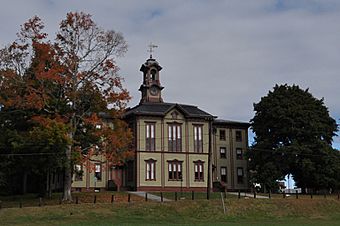Woodstock Academy Classroom Building facts for kids
|
Woodstock Academy Classroom Building
|
|
|
U.S. Historic district
Contributing property |
|
 |
|
| Location | 57 Academy Rd., Woodstock, Connecticut |
|---|---|
| Area | less than one acre |
| Built | 1873 |
| Architect | A. G. Cutler |
| Architectural style | Italianate |
| Part of | Woodstock Hill Historic District (ID98001578) |
| NRHP reference No. | 84001176 |
Quick facts for kids Significant dates |
|
| Added to NRHP | February 16, 1984 |
| Designated CP | February 16, 1984 |
The Woodstock Academy Classroom Building is a historic school building in the village of Woodstock Hill in Woodstock, Connecticut. Built in 1873, it is the oldest building still standing on the campus of Woodstock Academy, a school that was founded way back in 1802.
The building is a great example of a style called Italianate. Because of its age and importance, it was added to the National Register of Historic Places in 1984. This is a special list of places that are important to American history.
A Look at the Building's Design
The Woodstock Academy Classroom Building is a large, three-story wooden building. It sits on a small hill, looking over the Woodstock Green, a public park area. The building has a special style called Italianate architecture, which was popular in the 1800s and was inspired by Italian country houses.
Some of its key features include:
- A two-stage belltower on top.
- A projecting middle section that sticks out from the rest of the building.
- Decorative flat pillars and brackets under the roof.
- Fancy frames over the windows in the middle section.
This building is the only known school in Connecticut that still has so many of its original Italianate features.
History of the Building
Woodstock Academy is one of the oldest private schools in Connecticut. By the 1860s, its first building needed repairs. A local man named Henry Chandler Bowen wanted to help. His summer home, the famous Roseland Cottage, is also on the Woodstock Green.
In 1867, Bowen started a fundraising campaign to build a new classroom building. He promised to give $5,000 to the school and another $5,000 for the new building. But, he would only give the money if the town and other local people also helped raise funds.
The community came together, and they hired an architect named Alexander G. Cutler to design the new school. The building was finished in 1872 and has been an important part of the academy ever since.
| Article contributor: Robert J. Smith, Ph.D. Robert is a Historian of The Woodstock Academy. |
See also




